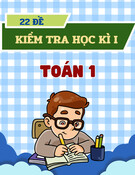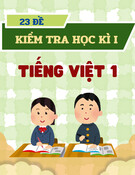
ĐỀ THI THỬ ANH VĂN - Lesson 1
I. Exercise 1: Choose one word whose underlined part is pronounced differently
from the others.
1. A. column B. stupid C. situation D. studio
2. A. like B. find C. mind D. film
3. A. benefit B. sentence C. get D. bed
4. A. fat B. date C. dad D. flat
5. A. study B. success C surprise D. sugar
II. Exercise 2: Choose from the four options given (marked A, B, C, and D) one best
answer to complete each sentence by circling the corresponding letter A, B, C or D.
6. He was..................by the clown.
A. amusing B. amuse C. amusingly D. amused
7. The students were.......................by the lesson and nearly fell asleep.
A. bored B. bore C. boring D. boredom
8. She has to live on.....................benefit because she is out of work.
A. employ B. unemployed
C. employment D. unemployment
9. The....................of Vinh Phuc Province is about one million.
A. populated B. population C. popular D.
populate
10. He gave a long......................about unemployment in Viet Nam.
A. lecturer B. lecturing C. lecture D. lectured
11. Lan is.........about going on this trip. She thinks it is going to be
an..............trip.
A. excited / excitement B. excitement / excited
C. exciting / excited D. excited / exciting
12. It is an.............book. We are......................in reading it.
A. interest / interested B. interesting / interested
C. interested / interest D. interested / interesting
13. Vietnamese people are...................of their literature.
A. famous B. interested C. keen D. proud
14. We haven't finished........................of the work.
A. much B. many C. a little D. a few
15. My brother is out of work, but he can get unemployment......................
A. money B. benefit C. cash D. currency
III. Exercise 3:Choose from the four options given (marked A, B, C, and D) one best
answer to complete each sentence by circling the corresponding letter A, B, C, or D.
16. He minds.......................English in class.
A. speak B. speaking C. to speak D. speaks
17. He's stayed.....................England since last Monday.
A. on B. for C. to D. in
18. We would rather...................football than any thing else.
A. playing B. to play C. played D. play
19. She.......................learning Chinese two years ago.
A. starts B. has stared C. started D. starting
20. I can't stand..................... my dad for pocket money.
A. ask B. asking C. asked D. to ask
21. He likes..................part in sports, so he joins the football team of school.
A. take B. taking C. takes D. took
22. Mom, we've run out of milk. I.....................to go out and buy some.
A. should B. have C. had better D. must
23. I am .......................of playing football.
A. excited B. worried C. surprised D. fond
24. Nam has learnt English for three years, and he is good................English now.
A. by B. in C. for D. at
25. Every day I spend two hours...........................English.
A. practise B. to practise. C. practising D. practised
IV. Exercise 4: One of those underlined words or phrases must be changed in order for
the sentence to be correct.
26. He was so tiring that he could not go home.
A B C D
27. The match shall be won by the best chess player.
A B C D
28. They would rather go by air as spend a week travelling by train.
A B C D
29. I can play the piano more good than my sister.

A B C D
30. Would you mind to lend me your motorbike until next week?
A B C D
31. I've known him for I left high school.
A B C D
32. Doesn't he get tired with watching TV every night?
A B C D
33. He thinks learn English is very easy.
A B C D
34. This bicycle is made from Thong Nhat bicycle factory.
A B C D
35. I spend half a year to build this boat.
A B C D
V. Exercise 5: Read the following passage then answer questions 36 - 40.
Mrs Kent is out of work. She has been out of work since 2000. She is very busy
with her housework. She's fed up with doing it every day. She is interested in going out
to meet her friends but she doesn't have time. She doesn't enjoy staying at home looking
after the children. She hates cooking dinner, cleaning the house. She is bored with
washing the dishes.
36. How long has Mrs Kent been out of work?
A. one year B. three years C. five years D. seven years
37. According to the passage, Mrs Kent is fond of......................
A. doing the housework B. meeting her friends.
C. looking after the children D. cooking dinner.
38. The word "it" in line 2 refers to..................
A. dishes B. housework C. dinner D. work
39. According to the passage, all the followings are true EXCEPT that..........
A. Mrs Kent is bored with cleaning the house. B. Mrs Kent dislikes
cooking dinner.
C. Mrs Kent is fond of meeting her friends. D. Mrs Kent enjoys doing
every work
40. What does " out of work" mean?
A. employ B. employment C. unemployed D.
unemployment
VI. Exercise 6: Read the following passage then answer questions 41-45.
Jane has been away from home for 2 years. On June 20th she will be flying to her
house in England. During her time away in Thailand, her family missed her as much as
she has missed them. They will meet her at the airport with kisses and tears. Jane will
be very happy to see all of them again. Her brother will no longer be little, but almost as
tall as their father. Her little sister will be probably wearing a green dress because that is
her favourite colour. She will have changed quite a bit, but she will still be mischievous
and talkative. She will ask Jane a thousand questions a minute. Her parents will be
smiling when they see her. Then they will go by taxi. In the evening, the whole family
will be sitting altogether and telling each other about what has happened during the past
two years. They will be happily enjoying a delicious dinner together after a long time
apart.
41. How will Jane go home?
A. By bus B. By train C. By ship D. By plane
42. Where will her family meet her?
A. At the bus stop B. At the station. C. At the airport D. At the post office
43. What will her little sister be wearing?
A. Her favourite colour B. Her favourite dress
C. A green dress D. A green blouse
44. What will her parents be doing when seeing her at the airport?
A. They will be smiling B. They will be shouting C. They will be crying D.They
will be sitting down
45. What will they be doing in the evening?
A. Eating, watching TV and talking. B. Sitting, talking and eating dinner together
C. Singing and dancing D. Walking and talking
IV. Exercise 7: ( Questions 46 – 50). The words in the original sentence have been
rearranged . Choose from the alternatives A, B, C and D one best way to rearrange the
words to make a meaningful sentence. Identify your answer by circling the
corresponding letter A, B, C or D.
46. Britain / in / of / a lot/ are / people / of / out / work / today.
A. To day, in Britain a lot of people are out of work. B. In Britain a lot of people are
out work of today.

C. In Britain a lot of people of out work today. D. In Britain a lot of people are
work out of today.
47. She / start / bringing / should / home / some money / her age / at.
A. She should start bringing at home some money her age.
B. She should start bringing some money home at her age.
C. She should start bringing home some money at her age.
D. She should start bringing home money some at her age.
48. I / hate / to ask / my mum / and / dad / having / for / money.
A. I hate having to ask for my mum and dad money.B. I hate to having ask my
mum and dad for money.
C. I hate having to ask my mum and dad money for.D. I hate having to ask my
mum and dad for money.
49. She / really / tired / of / is / looking / a new job / for.
A. She really is tired of looking for a new job. B. She is really tired of
looking for a new job.
C. She really is tired for looking of a new job. D. She is really tired of
looking for a job new.
50. Up / on / do not / early / Sunday / They / like / getting.
A. They do not like getting up early on Sunday. B. They do not like getting up
on Sunday early.
C. They do not like on Sunday getting up early. D. They do not like getting
early up on Sunday.
_____________________________________________
§¸p ¸n- lesson 1
I. Exercise 1:
1. A 2. D 3. A 4. B 5.D
II. Exercise 2:
6. D 7. A 8. D 9. B 10. C
11. D 12. B 13. D 14.A 15. B
III. Exercise 3:
16. B 17. D 18. D 19. C 20. B
21. B 22. B 23. D 24. D 25. C
IV. Exercise 4:
26. B 27. B 28. C 29. C 30. B
31. B 32. B 33. B 34. D 35. C
V. Exercise 5:
36. C 37. B 38. B 39. D 40. D
VI. Exercise 6:
41. D 42. C 43. C 44. A 45. B
VII. Exercise 7:
46. A 47. C 48. D 49. B 50. A

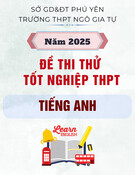

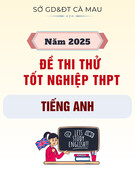
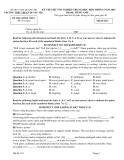
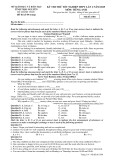
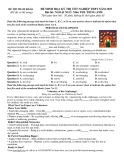
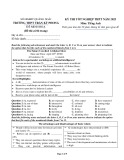
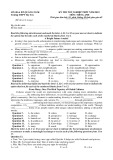
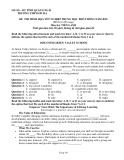
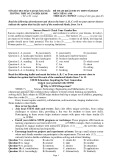





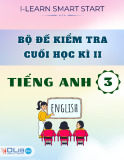

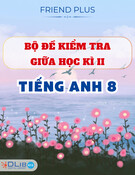
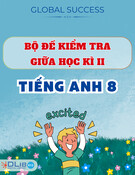
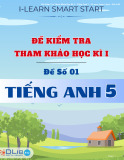

![Đề thi Tiếng Anh có đáp án [kèm lời giải chi tiết]](https://cdn.tailieu.vn/images/document/thumbnail/2025/20250810/duykpmg/135x160/64731754886819.jpg)
